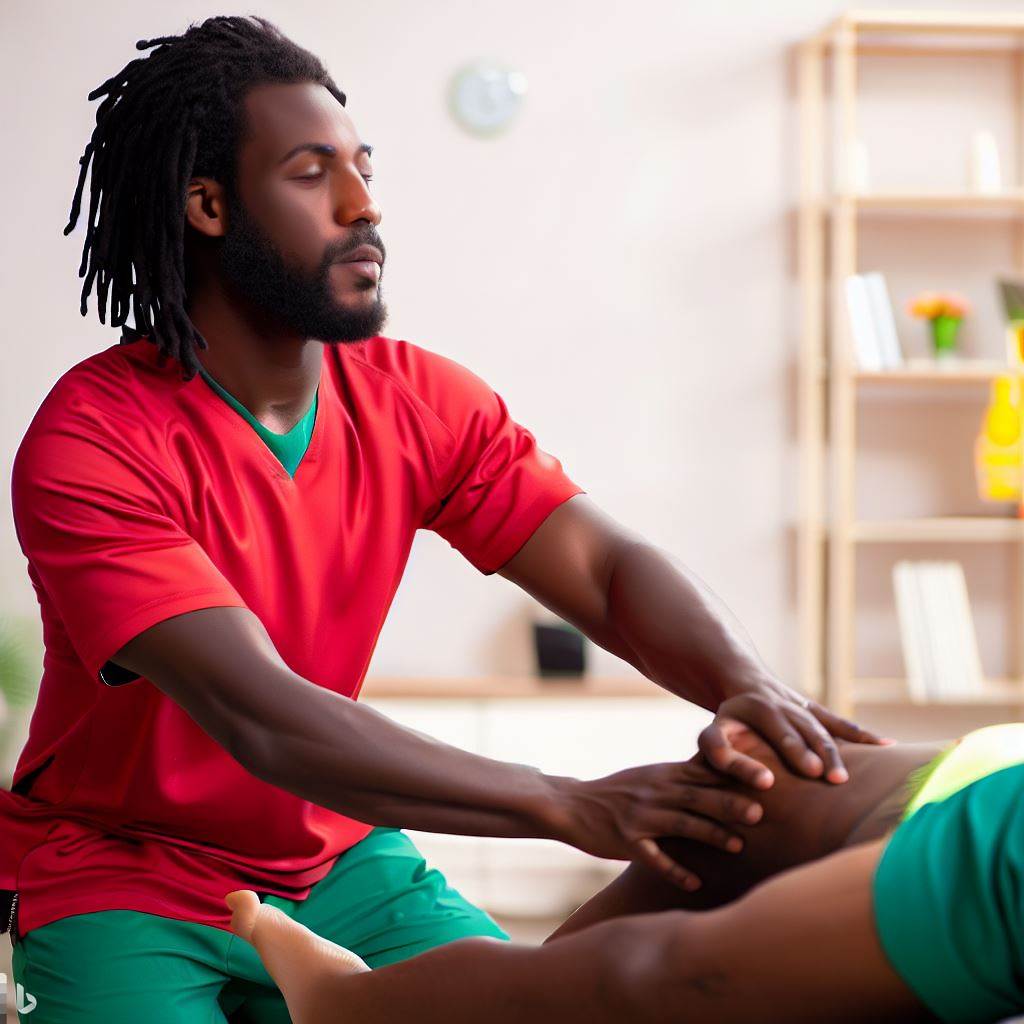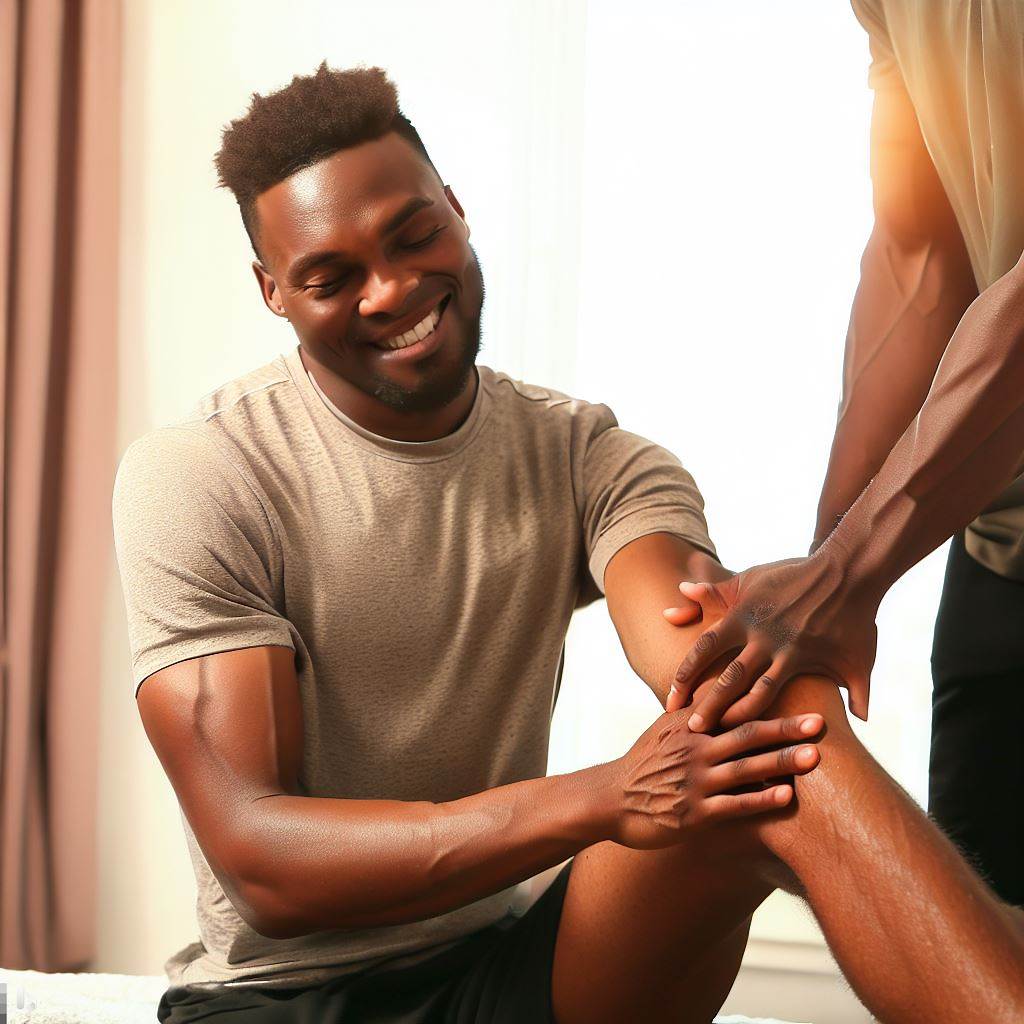Introduction
In the world of athletics, the skilled hands of sports massage therapists are instrumental.
Among these professionals, Nigerian sports massage therapists stand out for their crucial role in promoting physical well-being and elevating athletic performance.
This blog post delves into the life of a Nigerian sports massage therapist, shedding light on their unique journey and contributions.
Nigerian sports massage therapists are dedicated experts who specialize in delivering therapeutic massages tailored specifically for athletes.
Their primary objective is to optimize an athlete’s physical condition, aiding in recovery and enhancing performance.
This mission encompasses a wide range of activities, from reducing muscle tension and improving flexibility to addressing specific sports-related injuries.
To truly grasp the essence of a Nigerian sports massage therapist’s life, it’s essential to understand their extensive training and continuous learning.
These professionals undergo rigorous education in anatomy, physiology, and sports science to develop a profound understanding of the athlete’s body.
Their work is not confined to high-profile athletes alone; they also cater to amateur sports enthusiasts and individuals seeking to lead healthier lives.
This broad clientele requires adaptability, as therapists tailor their techniques to suit each individual’s needs.
The journey of a Nigerian sports massage therapist is a challenging but rewarding one. It involves long hours, dedication, and continuous skill development.
Moreover, they collaborate closely with other healthcare professionals, coaches, and trainers to create comprehensive wellness plans for athletes.
In fact, Nigerian sports massage therapists are unsung heroes in the world of sports.
Their dedication to enhancing physical well-being and performance is pivotal, making them invaluable assets to athletes and sports enthusiasts alike.
This blog post has offered a glimpse into the life of these remarkable professionals, highlighting their unwavering commitment to the pursuit of excellence in sports therapy.
Background on Nigerian Sports Massage Therapists
Growing Demand for Sports Massage Therapy in Nigeria
- The field of sports massage therapy is experiencing a significant increase in demand in Nigeria.
- As more professional athletes and sports enthusiasts recognize the benefits of this specialized massage therapy, the demand continues to grow.
- Sports massage therapy is widely used in Nigeria to improve athletic performance, prevent injuries, and aid in recovery.
- With the rise of sports-related injuries, athletes are turning to sports massage therapists for their expertise in handling such cases.
- This growing demand has created numerous job opportunities for individuals pursuing a career in sports massage therapy.
Qualifications and Certifications Required in Nigeria
- To become a sports massage therapist in Nigeria, individuals must undergo specific qualifications and certifications.
- Firstly, completion of a recognized massage therapy program is necessary to acquire the essential knowledge and skills.
- These programs typically cover anatomy, physiology, massage techniques, and injury management.
- Additionally, aspiring sports massage therapists must obtain accreditation from recognized sports massage associations or organizations in Nigeria.
- These certifications ensure that therapists adhere to professional standards and are equipped to provide effective treatments.
Role of Sports Massage Therapists in Injury Prevention and Recovery
- Sports massage therapists play a crucial role in preventing injuries among athletes in Nigeria.
- They assess an individual’s body condition, identify potential risks, and develop personalized treatment plans to minimize the occurrence of injuries.
- In the event of an injury, sports massage therapists aid in the recovery process.
- They utilize various massage techniques, such as deep tissue massage and myofascial release, to reduce pain, improve circulation, and promote healing.
- Sports massage therapists work closely with other healthcare professionals, such as physiotherapists and athletic trainers, to ensure comprehensive rehabilitation.
- Their expertise in sports-related injuries allows them to provide targeted treatments that accelerate recovery and prevent further complications.
- Moreover, these therapists offer advice on injury prevention strategies, including proper warm-up exercises and stretching routines.
- By implementing these strategies, athletes can effectively minimize the risk of injuries and enhance their overall performance.
In short, the demand for sports massage therapy in Nigeria is rapidly increasing.
Aspiring sports massage therapists must complete relevant qualifications and certifications to be recognized in the field.
These therapists play a vital role in injury prevention and recovery among athletes, providing specialized treatments and advice.
With the continued growth of sports-related activities in Nigeria, the role of sports massage therapists will become increasingly significant in maintaining athletes’ health and well-being.
Morning Routine
Wake up time and preparation for the day ahead
- My alarm goes off promptly at 6am, signaling the start of another busy day.
- I quickly stretch and get out of bed, ready to tackle the challenges that lie ahead.
- I brush my teeth, wash my face, and grab a quick shower to freshen up.
- After getting dressed in my comfortable work attire, I head to the kitchen for breakfast.
- A hearty bowl of oatmeal and a cup of coffee provide the fuel I need to power through the day.
- As I eat, I mentally prepare for the clients and sports events I’ll be attending today.
- I review my schedule, ensuring that I have all the necessary equipment and materials ready.
- Lastly, I double-check my bag to make sure I have everything I need before heading out the door.
Traveling to the first client or sports event
- I hop into my car and start the engine, eager to begin my day as a sports massage therapist.
- The streets are still relatively quiet as I make my way towards my first destination.
- I turn on some energizing music to set the mood and keep my spirits high during the commute.
- Along the way, I mentally prepare myself for the clients I’ll meet and the challenges they may present.
- I navigate through the traffic, staying calm and focused despite any delays or roadblocks.
- Finally, I arrive at the location, whether it’s a client’s home, a gym, or a sports venue.
Setting up the massage equipment and materials
- I park my car and gather all the necessary equipment from the trunk – massage table, oils, towels, and more.
- Carefully, I carry everything into the designated area where the massage will take place.
- I make sure the room is clean, well-ventilated, and conducive to a relaxing atmosphere.
- I set up the massage table, adjusting it to the perfect height and making sure it’s sturdy.
- Next, I lay out fresh towels and prepare an assortment of oils for the clients to choose from.
- Soft, soothing music fills the room, creating the ideal ambiance for a therapeutic experience.
- As a professional, I strive to create a welcoming and safe environment for my clients to trust in.
- Once everything is ready, I take a deep breath, mentally preparing myself to provide the best possible care.
Read: Women in Political Science: A Nigerian Perspective

Client Interactions
Describe the initial consultation with clients
During the initial consultation, I sit down with my clients to gather information about their medical history, injuries, and current physical conditions.
We discuss their reasons for seeking sports massage therapy and any specific areas of concern.
I ask about their daily activities, exercise routines, and goals to understand the demands they place on their bodies.
The consultation helps me assess their needs and develop a personalized treatment plan tailored to their unique situation.
Explain the importance of understanding each client’s individual needs and goals
Understanding each client’s individual needs and goals is crucial for providing effective sports massage therapy.
Everyone’s body is different, and having insight into their specific requirements allows me to address their concerns accurately.
By recognizing their goals, whether it’s improved performance, injury prevention, or pain relief, I can tailor the session accordingly.
Taking the time to understand their needs ensures that I provide the most beneficial treatment for their overall well-being.
Highlight the communication skills utilized during the session
Effective communication is key during a sports massage therapy session.
I constantly check in with my clients to gauge their comfort level and adjust the pressure and techniques accordingly.
I encourage them to provide feedback, ensuring the session is customized to their preferences.
Explaining the purpose of each technique and its potential benefits helps them understand the process and feel more relaxed.
Clear communication also allows me to educate clients on self-care techniques to maintain the benefits of the session outside of our sessions.
By establishing open lines of communication, I create a safe and collaborative environment for the clients to actively participate in their healing journey.
In essence, client interactions play a vital role in the work of a Nigerian sports massage therapist.
The initial consultation helps me gather necessary information, and understanding each client’s needs and goals allows for personalized treatment.
Effective communication throughout the session ensures client comfort and satisfaction, leading to optimal outcomes and overall wellness.
Read: Becoming a Casino Host in Nigeria: A Step-by-Step Guide
Types of Sports Massage Therapy Techniques Used
Different Types of Massage Techniques Commonly Used
- Effleurage: Long, gliding strokes used to warm up muscles and increase circulation.
- Petrissage: Kneading and squeezing of muscles to relieve tension and improve flexibility.
- Tapotement: Rhythmic tapping or pounding to stimulate muscles and prepare them for activity.
- Friction: Deep, circular rubbing to break down scar tissue and promote healing.
- Compression: Steady pressure applied to an area to reduce pain and inflammation.
How Each Technique Benefits Athletes and Aids in Performance Enhancement
- Effleurage increases blood flow, providing oxygen and nutrients to the muscles, promoting relaxation and reducing muscle soreness.
- Petrissage helps to eliminate waste products from the muscles, improves range of motion, and prevents muscle imbalances.
- Tapotement boosts muscle responsiveness, improves muscle tone, and prepares the body for intense physical activity.
- Friction breaks down scar tissue and adhesions, reducing pain, improving mobility, and enhancing athletic performance.
- Compression reduces inflammation and swelling, relieves pain, and promotes faster recovery after intense training or competition.
Examples of Specific Situations Calling for Different Techniques
- Pre-Event Massage: A combination of effleurage, petrissage, and tapotement techniques are used to warm up the muscles, increase circulation, and stimulate the athlete before an event.
- Post-Event Massage: Friction and compression techniques are commonly used to reduce muscle soreness, promote recovery, and prevent potential injuries after intense physical activity.
- Injury Rehabilitation: A combination of petrissage, friction, and compression techniques are applied to break down scar tissue, promote healing, and restore range of motion in injured muscles.
- Maintenance Massage: Effleurage, petrissage, and compression techniques are used to maintain muscle flexibility, prevent injuries, and enhance overall athletic performance during regular training periods.
In the Life of a Nigerian Sports Massage Therapist, understanding diverse techniques is essential for effective therapy. These methods cater to athletes’ unique needs and enhance their performance.
Effleurage features long, gliding strokes that prep muscles and boost circulation, promoting relaxation, reducing soreness, and supplying vital nutrients.
Petrissage involves muscle kneading, eliminating waste, enhancing flexibility, and preventing imbalances, aiding athletes’ peak performance.
Tapotement utilizes rhythmic tapping to improve muscle tone, readiness for intense activities, and responsiveness.
Friction breaks down scar tissue, reduces pain, and enhances mobility, addressing chronic injuries.
Compression eases inflammation, relieves pain, and speeds recovery, vital during rehabilitation and post-event recovery.
Tailoring techniques to athletes’ needs optimizes performance, prevents injuries, and fosters well-being.
Read: Continued Education for Sports Massage Therapists in Nigeria
Challenges Faced by Nigerian Sports Massage Therapists
Highlight the difficulties of working in a physically demanding profession
- Constant physical strain: Nigerian sports massage therapists endure long hours of physically demanding work.
- Muscle fatigue: The repetitive nature of the job often leads to muscle fatigue and potential injuries.
- Lack of rest time: The demanding schedule leaves little time for relaxation and self-care.
- Emotional exhaustion: Dealing with the physical and emotional pain of athletes can take a toll on therapists.
Discuss the limited recognition and support for sports massage therapy in Nigeria
- Lack of awareness: Many individuals in Nigeria are unaware of the benefits and importance of sports massage therapy.
- Limited professional recognition: The profession is often overshadowed by other healthcare fields.
- Insufficient resources: Therapists face challenges in accessing essential equipment and training.
- Limited inclusion in sports teams: Nigerian sports massage therapists struggle to gain recognition as integral members of professional teams.
Address the financial struggles often faced by practitioners
- Low pay rates: Sports massage therapists in Nigeria often receive lower pay compared to other healthcare professionals.
- Inconsistent income: The irregularity of clients and events can lead to financial instability.
- Limited job opportunities: The scarcity of job openings makes it difficult for therapists to find steady employment.
- Cost of continuing education: Ongoing training and certification can be expensive and unaffordable for many practitioners.
The life of a Nigerian Sports Massage Therapist presents significant challenges. Foremost among these is the limited recognition and support they receive.
In Nigeria, many remain unaware of the benefits that sports massage therapy offers to athletes.
Consequently, the profession struggles to attain professional recognition, often overshadowed by other healthcare sectors.
This lack of awareness further results in a scarcity of resources, hampering therapists’ access to essential equipment and training. Integration into professional sports teams is equally elusive.
Financial hardships compound these difficulties. Nigeria’s low pay rates make it hard for therapists to secure a sustainable income.
Irregular client flow and event-based income add to the financial instability. Limited job opportunities exacerbate the problem, leaving therapists struggling for steady employment.
Continuing education is vital for therapists to stay updated, but the cost of training and certification burdens practitioners in Nigeria, hindering their professional growth.
Nevertheless, Nigerian sports massage therapists remain steadfast, understanding their pivotal role in aiding athletes’ recovery, performance enhancement, and injury prevention.
Recognition, funding, awareness, and job opportunities can vastly improve their circumstances, enabling them to thrive in their profession.
Read: Top Clinics for Sports Massage Therapy Treatment in Nigeria
See Related Content: Challenges of an Events Coordinator in Nigeria’s Market
Job Satisfaction and Rewards
Fulfillment Derived from Helping Athletes Perform at Their Best
- As a Nigerian sports massage therapist, one of the greatest joys is experiencing the fulfillment that comes from helping athletes excel in their performance.
- Through the application of specialized techniques, I am able to alleviate muscle tension, reduce pain, and enhance athletes’ physical abilities.
- Witnessing their progress and seeing them achieve their goals is incredibly rewarding, knowing that my contribution played a part.
- The sense of fulfillment that comes from helping athletes reach their full potential is unparalleled and keeps me motivated in my career.
Joy of Witnessing Clients Recover from Injuries
- Another aspect of my job that brings immense joy is witnessing the recovery of clients who have suffered injuries.
- Through sports massage therapy, I can support the healing process, promote tissue regeneration, and assist in rehabilitation.
- Seeing clients regain their strength, mobility, and confidence after overcoming obstacles is truly gratifying.
- It is a privilege to be a part of their healing journey and witness firsthand the positive impact of my work on their lives.
Long-Term Relationships Built with Athletes and Teams
- One of the unique aspects of being a sports massage therapist is the opportunity to build long-term relationships with athletes and teams.
- Through regular sessions, I develop a deep understanding of their bodies, needs, and preferences.
- This familiarity allows me to tailor my techniques and treatments to their specific requirements, maximizing effectiveness.
- Over time, a strong bond is formed, and I become not just a therapist but also a trusted confidant and supporter.
- Building these relationships brings a sense of fulfillment and satisfaction, knowing that I am contributing to their overall well-being.
In general, being a Nigerian sports massage therapist offers great job satisfaction and rewards.
The fulfillment derived from helping athletes perform at their best, witnessing clients recover from injuries, and building long-term relationships with athletes and teams is truly gratifying.
These aspects of my job keep me motivated and dedicated to making a positive impact on the lives of those I work with.
Conclusion
In summary, a typical day in the life of a Nigerian sports massage therapist is filled with constant activity and challenges.
Their work is crucial in helping athletes prevent injuries, recover quickly, and improve performance.
I encourage readers to consider sports massage therapy as a profession or valuable service, as it plays an important role in the world of sports.
Recap of a Typical Day:
- Nigerian sports massage therapists begin early, gearing up for a demanding day.
- They work closely with athletes, addressing muscle tension and injury prevention.
- Assessing client needs and tailoring treatments is a daily routine.
- Massages are followed by stretching exercises to optimize athletes’ performance.
- Constant communication and adaptability are crucial throughout the day.
Emphasize the Importance:
- Their work enhances athletes’ flexibility and reduces the risk of injuries.
- Sports massage therapists play a pivotal role in performance optimization.
- They aid in post-game recovery, improving athletes’ overall well-being.
Encourage Consideration:
- Consider a career in sports massage therapy, a rewarding profession.
- Athletes and active individuals benefit immensely from their expertise.
- Recognize the value of their service in promoting health and peak performance.




